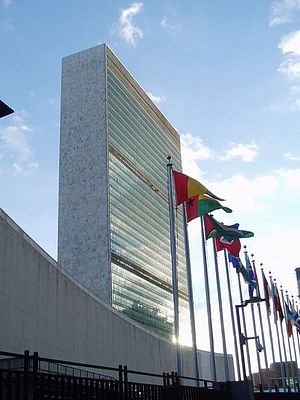Japanese Prime Minister Shinzo Abe’s visit at the end of 2013 to the Yasukuni Shrine in Tokyo, where 14 “Class A” war criminals are enshrined, made it to the agenda of the UN Security Council Wednesday. The comments came during an open debate session of the Security Council.
China’s Permanent Representative to the UN Liu Jieyi chastised Prime Minister Abe’s visit during a broader debate on the lessons of conflict, according to a report by South China Morning Post.
Liu noted that Japan’s attempt to change history – as highlighted by Abe’s comments, visit to Yasukuni, and Japan’s recent revised teaching guidelines – “destabilize regional peace and pose a serious challenge to the peaceful course of mankind.”
Liu added that Prime Minister Abe “paid homage to those who launched a war of aggression and were up to their elbows in the blood of the people in the countries they invaded … Abe’s homage to those fascist war criminals is nothing less than a challenge to the victorious outcome of the war against fascism. Abe is trying to reverse the verdict on the war and defend war criminals.”
In an attempt to rebuff the accusations by the Chinese Ambassador, Japan’s Ambassador Kazuyoshi Umemoto responded that “Japan does not believe that such actions are helpful in lowering tensions and enhancing the stability in the region.”
South Korea’s Permanent Representative backed the Chinese Ambassador against Japan, harkening back to Japan’s use of Korean comfort women during the second World War.
Oh Joon, the Korean ambassador, added that “Tensions are escalating more than ever before due to the distrust among states in Northeast Asia … If Japan seriously wishes to contribute to regional and global peace, it should refrain from provoking its neighbors with its denial of history.”
According to Xinhua, North Korean Ambassador Ri Tong Il insisted that the “UN should pay due attention to and make every effort to the issue of outstanding crimes against humanity committed during World War II.”
Ri added that “The past crimes committed by Japan against the people of Korea, against the people of China, against the people of the Southeast Asian countries cannot be found in its precedence in the history of mankind, in its degree of its savageness and brutality and it is the common issue which does not belong to only Asian countries; it is an issue belonging to entire humanity.”
The UN debate on reconciliation in the aftermath of conflicts was kicked off by a statement by a political official that “a halt to fighting does not necessarily end a conflict,” inciting the exchange of allegations by the three Northeast Asian ambassadors.
The tensions between China and Japan at the UN tie into a broader global public relations struggle between the two. Recently, Chinese and Japanese diplomats lashed out at each other in a series of editorials. Chinese Ambassador Liu Xiaoming and Japanese Ambassador Keiichi Hayashi compared each other’s countries to Voldemort, the antagonist from J.K. Rowling’s Harry Potter series.

































